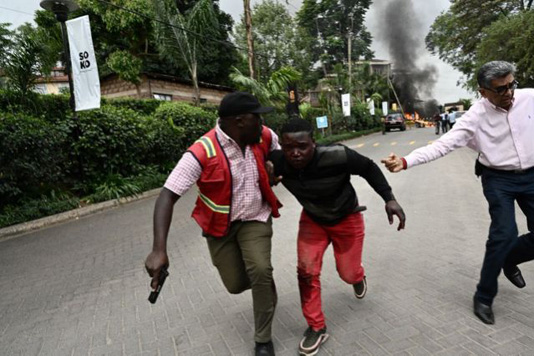
NAIROBI, Feb 22 (NNN-AGENCIES) – Profiles of key suspects in January’s terror attack in Nairobi point to the worrying rise of a new generation of Kenyan jihadists, analysts say.
Police are hunting Ali Salim Gichunge, the suspected mastermind of the Jan 15 attack on the Dusit hotel and office complex that left 21 dead, and Violet Kemunto Omwoyo, described as a Christian convert to Islam.
Their background and ethnic origins are starkly different from that of typical Kenyan members recruited in the past by Al-Shabaab.
Somalia’s Al-Qaeda affiliate has mainly used recruits from Kenya’s ethnic Somali community or coastal Muslim communities.
In addition, Shabaab’s major previous attacks in Kenya, against the Westgate shopping mall in 2013, which left 67 dead, and the University of Garissa in 2015 in which 148 people died, were planned in Somalia.
“Unlike previous attacks that had aspects of external planning and involvement, this particular incident points to local planning,” and includes converts from Christianity, a senior police officer said.
Gichunge, believed to be aged about 23, is from central Isiolo and is the son of a Kenyan soldier. His name is from the country’s largest ethnic group, the Kikuyu.
Omwoyo, aged in her late twenties, is believed to be from Kisii in western Kenya.
The pair shared a home in Ruaka, northwest of the capital, where police say they found guns stashed in a hole in one of the rooms.
Police found the hideout after Gichunge was identified as the owner of a vehicle which transported the attackers to the hotel and office complex.
He was initially thought to be among those killed.
But it emerged both he and Omwoyo were on the run at the time of the operation, and had put household items up for sale in the days before the attack.
The five Dusit attackers were all killed during the attack, and at least three of them were from Kenya’s ethnic Somali community, one came from the coastal region and another has yet to be identified.
The weapons they used were transported from Somalia via Lamu county where the group has long held a strong presence in the Boni forest, or via the Mandera town border with Somalia, according to police sources.
Investigators say that Gichunge spent time training in Somalia.
In 2015, Sahan think-tank warned that to escape scrutiny, the jihadists had shifted their recruiting drive in Kenya away from the big cities of Nairobi and Mombasa to new areas, including the Rift Valley and the west of the country.
The report also noted the increasing recruitment of Christian converts, notably due to the granting of bursaries for Islamic Studies, and of girls and young women.
The new jihadists are radicalised in “areas which are not closely watched” and “they use hideouts in places where the police will not expect them,” the source said. — NNN-AGENCIES



